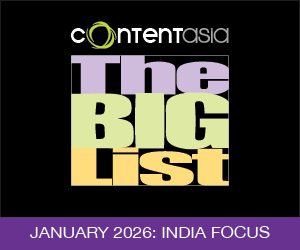
Cambodia’s largest broadcaster, Cambodian Broadcasting Service (CBS) is rolling out an international charm offensive on the back of the blockbuster launch of the new season of MasterChef Cambodia and the beginnings of a plan to build a global production destination.
The latest adaptation of the Banijay unscripted format broke viewership records for its premiere on Sunday, 8 June, with 1.1 million organic views on Facebook Live, the platform of choice for the Phnom Penh-based broadcaster.
In a country of 18 million people, fewer than three million TV households, and about 13 million Facebook users, the episode generated 34,000 reactions, 11,400 comments and 10,000 shares, making it the most engaged digital TV event in Cambodian history. The show airs on CTN (Cambodian Television Network) one of CBS’ free-TV channels. The other broadcast channels include MyTV (youth) and CNC (Cambodian News Channel).
Celebrations on MasterChef’s performance went right up to the top of CBS’s Phnom Penh-based parent – the Royal Group of Companies, a privately owned Cambodian conglomerate whose business sprawls across banking, finance, insurance, hotels and resorts, transport, aviation, energy, health and property investment, to name a few.
After the live premiere, a note from the Group’s HQ described the performance as a “milestone” and said the production was a “flagship example of the future of entertainment – local, scalable, and socially engaging”. It’s also vindication for a strategy that puts CBS at the mercy of the Facebook algorithm.
For veteran Asia media exec Dave Ulmer, who joined CBS as CEO two years ago, the broadcaster’s Facebook embrace is a no-brainer. The Meta platform is so entrenched in Cambodia that many companies don’t even bother with their own websites anymore, he says.
MasterChef Cambodia’s Facebook engagement is overwhelmingly local, which satisfies CBS domestic sponsors at the same time as overcoming broadcast TV infrastructure and traditional distribution challenges. Ulmer has also rolled out a company-wide AI adoption programm...
Cambodia’s largest broadcaster, Cambodian Broadcasting Service (CBS) is rolling out an international charm offensive on the back of the blockbuster launch of the new season of MasterChef Cambodia and the beginnings of a plan to build a global production destination.
The latest adaptation of the Banijay unscripted format broke viewership records for its premiere on Sunday, 8 June, with 1.1 million organic views on Facebook Live, the platform of choice for the Phnom Penh-based broadcaster.
In a country of 18 million people, fewer than three million TV households, and about 13 million Facebook users, the episode generated 34,000 reactions, 11,400 comments and 10,000 shares, making it the most engaged digital TV event in Cambodian history. The show airs on CTN (Cambodian Television Network) one of CBS’ free-TV channels. The other broadcast channels include MyTV (youth) and CNC (Cambodian News Channel).
Celebrations on MasterChef’s performance went right up to the top of CBS’s Phnom Penh-based parent – the Royal Group of Companies, a privately owned Cambodian conglomerate whose business sprawls across banking, finance, insurance, hotels and resorts, transport, aviation, energy, health and property investment, to name a few.
After the live premiere, a note from the Group’s HQ described the performance as a “milestone” and said the production was a “flagship example of the future of entertainment – local, scalable, and socially engaging”. It’s also vindication for a strategy that puts CBS at the mercy of the Facebook algorithm.
For veteran Asia media exec Dave Ulmer, who joined CBS as CEO two years ago, the broadcaster’s Facebook embrace is a no-brainer. The Meta platform is so entrenched in Cambodia that many companies don’t even bother with their own websites anymore, he says.
MasterChef Cambodia’s Facebook engagement is overwhelmingly local, which satisfies CBS domestic sponsors at the same time as overcoming broadcast TV infrastructure and traditional distribution challenges. Ulmer has also rolled out a company-wide AI adoption programme to boost efficiency and productivity.
“Three years ago a hit TV show on broadcast TV would attract about 300,000 viewers, or between 10% and 12% of households. That doesn’t matter any more compared to the millions online,” he says.
MasterChef is part of a much bigger picture Ulmer draws, one which raises Cambodia’s voice in the global production conversation and creates a bridge between Hollywood and Cambodia.
The goal took a step forward in May with a MoU between CBS’s studio facility, Camwood Studios, and The Studio in Los Angeles, co-founded by Sandy Grigsby and Ken Rutkowski. The newly minted partners have up to 10 international film and TV productions on their timetable over the next two years. Project details have not been disclosed, but the first one should start filming in Q4 this year and run into 2026.
The MoU is anchored in a commitment to scale up Cambodia’s creative ecosystem and economy, including training, production services and support and post production.
Cambodia, not known for international productions, has enjoyed a flash of international entertainment recognition here and there, most notably in Angelina Jolie’s First They Killed My Father (2017) and Cambodian-French filmmaker Rithy Panh films such as The Missing Picture (2014) and Rice People (1994).
But the country’s true creative potential is nowhere near being realised, Ulmer says, talking up the development plan and at the same time laying out clear challenges, led by a small, difficult-to-scale domestic production industry.
“With the exception of a few films, most of the content here doesn’t travel,” he says.
Cambodia has a dozen general entertainment free-TV channels. These air a mix of local Khmer, Thai, Chinese and some Korean content. Local tastes overwhelmingly lean towards local Cambodian programs, and virtually all of our audience has moved online, Ulmer says.
Cambodia’s film ecosystem is tiny, with about 100 screens – about a third of which are operated by the Thai-based Major – mostly in Phnom Penh. Local film budgets average about US$100,000, with lows of US$10,000 and rare highs of US$500,000.
Cambodian box office data is thin. Box Office Mojo has a few figures: The top weekend gross in 2023 was just under US$151,000 for John Wick: Chapter 4. That’s three times higher than any other film over a weekend for the year. Top weekend box office last year was US$8,000 for The Crow. This year so far, weekend box office topped out at less than US$4,000.
The upside is a friendly, lower-cost relatively easy to navigate on-ground environment.
Ulmer kicked off his plan to grow Cambodia’s production muscle by re-organising resources and renting out CBS’ equipment and facilities, including six sound stages at the rebranded Camwood Studios. Two years later, he’s ready to start welcoming foreign productions.
What’s next? Expanding the existing tax incentive structure for foreign companies to include incentive and rebate packages to rival those offered by its neighbours, led by Thailand. He’s working on it.
A version of this article appeared in ContentAsia's eNewsletter on 16 June 2025































